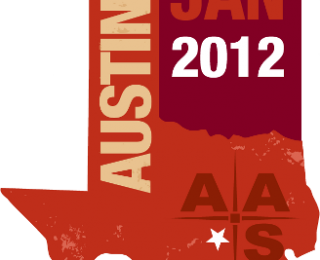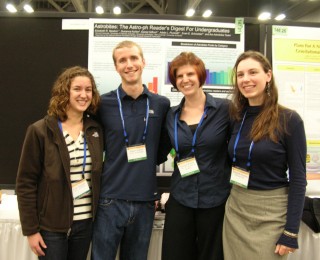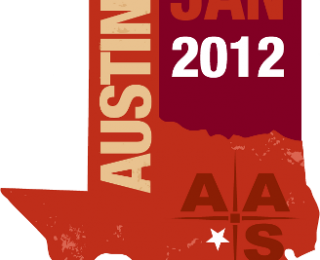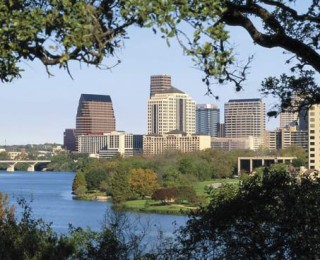
by Astrobites | Jan 10, 2012 | Current Events
A collection of thoughts about AAS events throughout Tuesday morning.

by Adele Plunkett | Jan 10, 2012 | Career Navigation
The Monday morning workshop “Careers 101” at the AAS Austin meeting provided a room full of graduate students with several important aspects to ponder when considering our potential career paths, as well as some action advice to follow to develop our careers in the direction that we choose. I blogged a summary of the workshop here, and promised to follow up with some more specific details. I invite comments on this post, if you have any suggestions or advice you would like to contribute related to astronomy career paths.The workshop was organized around a panel, introduced and moderated by Alaina Levine (founder of Quantum Success Solutions).Panelists: Dawn Gelino (NASA Exoplanet Science Institute) Adam Kraus (Hubble Postdoctoral Fellow) Edward Ajhar (NSF Program Officer) Anita Cochran (Assistant Director of McDonald Observatory) Joe Bernstein (Argonne National Lab)Advice (in no particular order): 1. Network. Establish your brand, realizing that at every stage of your career you can be the world’s expert on a niche subject at some level. Find confidence in this.2. Make yourself stand out. If you are in a collaboration (especially if it is a large collaboration), take ownership of some aspect of the science.3. Prove yourself by earning your own grants and fellowships. Writing proposals is good experience, even as a grad student or postdoc.4. Think about what will make you happy. Is an R1 research career, tenure track, what you would enjoy doing? Ask others, do some soul searching. Keep in mind that only 1 in 4 of us will get a tenure track position. Whatever you decide, you CAN change your mind later, but you should start on...
by Elisabeth Newton | Jan 9, 2012 | Current Events
Simulations tell us of a web-like Universe but it’s hard to explore this topic observationally because we can’t see dark matter. But the Canada-France-Hawaii Telescope (CFHT) Lensing Survey has made the first large scale map of dark matter. On the first day of AAS #219, the CFHTLenS survey shared their results with us.a

by Astrobites | Jan 8, 2012 | Current Events
This year, Astrobites will be liveblogging AAS. In order to avoid inundating our readers’ RSS feeds, we’ll be updating this post with short paragraphs about the talks we’ve heard and posters we’ve seen. So keep checking back throughout Monday afternoon! Earlier, we covered the Monday Morning sessions. A side noteThanks to everyone who stopped by the Astrobites poster today! We loved getting to meet you all in person, and getting to hear about your work as well as chat about ours. 3:40 PM The Challenges and Achievements in 50 Years of Human Space flight, Steven Hawley (University of Kansas) Quoted in this talk:“Anyone who sits on top of the largest hydrogen-oxygen fueled system in the world; knowing they’re going to light the bottom—and doesn’t get a little worried—does not fully understand the situation.” — John Young, shuttle commander, after being asked if he was worried about making the first Space Shuttle flight. 2:30 PM – Press Release: SCIENCE SO FAR FROM LOFARLOFAR: The Low Frequency Array Heino Falcke (MPI Für Radioastronomie/Radboud University/ASTRON, Germany) Michael Wise (ASTRON, Netherlands Institute for Radio Astronomy)First Results from the LOFAR Multifrequency Snapshot Sky Survey George H. Heald (ASTRON, Netherlands Institute for Radio Astronomy)Pulsars & Fast Transients with LOFAR Jason Hessels (ASTRON, Netherlands Institute for Radio Astronomy)LOFAR and the Epoch of Reionization A. G. de Bruyn (ASTRON, Netherlands Institute for Radio Astronomy)LOFAR (a multi-purpose sensor array which stands for the LOw Frequency ARray) is a new science project comprised of 200 astronomers from 40 institutes in several countries. LOFAR has components at stations in the Netherlands, Germany, Sweden, the UK and France. This press conference is to...

by Astrobites | Jan 8, 2012 | Current Events
A collection of thoughts about AAS events throughout Monday morning.

by Elisabeth Newton | Jan 7, 2012 | Current Events, Quick Notes
The winter meeting of the American Astronomical Society (AAS) will kick off on Sunday. The 219th meeting will take place in Austin, Texas from January 8-12. There will be four full days of talks and posters on every topic in astronomy. We’ve written about previous AAS Meetings, including Boston (AAS #218) and Seattle (AAS #217).This year at AAS, we’ll be doing something different: liveblogging the conference. The Astrobites authors attending the conference will be keeping you up to date on some of the talks and posters through tweets, short posts and longer pieces. With support from the wonderful folks at AAS, especially Debra Elmegreen and Rick Fienberg, we’ll be attending the press meetings so we can keep you up to date on the exciting discoveries being presented at AAS. So from Monday through Thursday, follow us on twitter and keep checking back here at astrobites.com for updates.If you’ll be at AAS this year, we’d love it if you’d stop by the Astrobites poster! We will present the results of the latest Astrobites Readership Survey and data collected on visits to the site.Astrobites: The Astro-ph Reader’s Digest For Undergraduates Poster #147.01 Monday, Jan 09, 2012, 9:00 AM – 6:30 PMThere several special events for undergraduates at AAS. On Sunday evening there is an undergraduate reception. The Astrobites authors will also be in attendance, so look for us there! On Tuesday, Jane Rigby has organized an exciting splinter session for students of all levels.Student Meet-Up with Nobel Laureate John Mather Tuesday, Jan 10, 2012, 10:00 AM -11:30 AM Room 8The following Astrobites authors will be in attendance and have individual posters and presentations:Dan...





